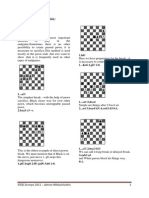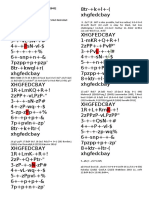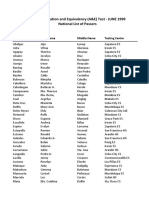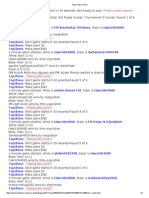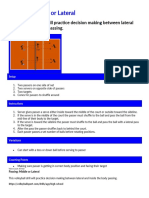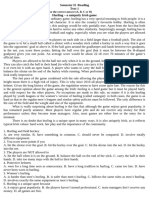0 ratings0% found this document useful (0 votes)
60 viewsFide June 2016 - Petrosyan
Fide June 2016 - Petrosyan
Uploaded by
Maestro Jay1. The document discusses several famous chess endgames involving grandmasters like Botvinnik, Leko, Topalov, and Caruana to illustrate the importance of knowing key positions and how they can be applied in practical play.
2. It analyzes in detail the legendary endgame between Botvinnik and Najdorf from 1956, noting how Leko later used the same winning method against Topalov, and how the position was also important in Caruana vs Anand.
3. It then examines the endgame between Leko and Topalov from 2002, where Leko tried to repeat the Botvinnik win despite the position technically being a draw
Copyright:
© All Rights Reserved
Available Formats
Download as PDF, TXT or read online from Scribd
Fide June 2016 - Petrosyan
Fide June 2016 - Petrosyan
Uploaded by
Maestro Jay0 ratings0% found this document useful (0 votes)
60 views6 pages1. The document discusses several famous chess endgames involving grandmasters like Botvinnik, Leko, Topalov, and Caruana to illustrate the importance of knowing key positions and how they can be applied in practical play.
2. It analyzes in detail the legendary endgame between Botvinnik and Najdorf from 1956, noting how Leko later used the same winning method against Topalov, and how the position was also important in Caruana vs Anand.
3. It then examines the endgame between Leko and Topalov from 2002, where Leko tried to repeat the Botvinnik win despite the position technically being a draw
Original Description:
Fide June 2016 - Petrosyan
Copyright
© © All Rights Reserved
Available Formats
PDF, TXT or read online from Scribd
Share this document
Did you find this document useful?
Is this content inappropriate?
1. The document discusses several famous chess endgames involving grandmasters like Botvinnik, Leko, Topalov, and Caruana to illustrate the importance of knowing key positions and how they can be applied in practical play.
2. It analyzes in detail the legendary endgame between Botvinnik and Najdorf from 1956, noting how Leko later used the same winning method against Topalov, and how the position was also important in Caruana vs Anand.
3. It then examines the endgame between Leko and Topalov from 2002, where Leko tried to repeat the Botvinnik win despite the position technically being a draw
Copyright:
© All Rights Reserved
Available Formats
Download as PDF, TXT or read online from Scribd
Download as pdf or txt
0 ratings0% found this document useful (0 votes)
60 views6 pagesFide June 2016 - Petrosyan
Fide June 2016 - Petrosyan
Uploaded by
Maestro Jay1. The document discusses several famous chess endgames involving grandmasters like Botvinnik, Leko, Topalov, and Caruana to illustrate the importance of knowing key positions and how they can be applied in practical play.
2. It analyzes in detail the legendary endgame between Botvinnik and Najdorf from 1956, noting how Leko later used the same winning method against Topalov, and how the position was also important in Caruana vs Anand.
3. It then examines the endgame between Leko and Topalov from 2002, where Leko tried to repeat the Botvinnik win despite the position technically being a draw
Copyright:
© All Rights Reserved
Available Formats
Download as PDF, TXT or read online from Scribd
Download as pdf or txt
You are on page 1of 6
Arshak Petrosyan: following examples will prove, keeping this
in mind can help us in different situations to
aim for this transition! Before looking at the
Practical rook endgames exact way to win this position, let`s see how
did Botvinnik got to this position in that
In this article I would like to illustrate, with legendary game. White is clearly in the
couple of examples from the highest level, driver seat, but still needs to be precise.
the need of knowing important positions and Botvinnik as usual showed excellent technic.
how we can benefit from it in practical play. 1.Kf5!
In one of our sessions about rook endgames The activation of the king is decisive.
beginning of 2002 with Peter Leko, we had a 1...Rb5
look at the famous Botvinnik : Najdorf 1...Rf3? 2.Kg6+.
endgame and little did we know at that time 2.Ke6 a3 3.f4!
that it will soon be a start of a special White has the vision what he is aiming for!
journey. First it was like a fairytale that just 3...a2
3 month later Peter managed to win a 3...Ra5 4.Ra7+.
blindfold game against Topalov in Monaco, 4.Ra7 Rb6 5.Kf5
by exactly the same method as in the studied The material is balanced but Black is
classic. It is always a great feeling to get a hopeless.
reward for the hard work. However that is 5...Rb7
only the beginning of the story because 5...Rb2 6.Kg6 Kf8 7.Ra8 Ke7 8.Kg7 Rg2
Topalov after waiting for 11 years got the 9.Ra7! Ke6 10.Kh6 Rg4 11.f5 Ke5 12.Ra2
chance to use the same method to win. Last Re4 13.Ra5 and next Kg6 wins.
but not least the game Caruana : Anand from 6.Ra2 Kf7
2015 showed that, if you already have the XIIIIIIIIY
knowledge about the dangers, how you can
use it for defending a difficult position! So, 9-+-+-+-+0
first let`s start with the classical example. 9+r+-+kzp-0
Botvinnik M. : Najdorf M.
9-+-+-zp-zp0
Moscow 1956 9+-+-+K+P0
XIIIIIIIIY 9-+-+PzPP+0
9-+-+-+k+0 9+-+-+-+-0
9+R+-+-zp-0 9R+-+-+-+0
9-zP-+-zp-zp0 9+-+-+-+-0
9+-+-+-+P0 xiiiiiiiiy
9p+-+PmKP+0 7.Ra5!
7.e5 leads to the same, but newertheless it is
9+r+-+P+-0 worth mentioning the precision with which
9-+-+-+-+0 the legendary World Champion treats this
9+-+-+-+-0 endgame. Black is doomed to passive
defence, so White first improves the position
xiiiiiiiiy to the maximum before taking action.
We should keep in mind that this is a 7...Rc7 8.Rd5!
winning position for White and as the The ideal placement of the rook. Now
FIDE Surveys - Arshak Petrosyan Stran 1
everything is set to push the e-pawn. remember! One always has to watch out, as
8...Ra7 9.e5 fe5 10.fe5 Ke7 13.Rd7? would spoil everything: 13...Rd7
10...Rb7 11.Rd7 Rd7 12.e6 Ke7 13.ed7 Kd7 14.ed7 Kd7 15.Kg6 hg5 16.Kg7 g4 and it
14.Kg6 wins. ends in draw.) 13...hg5 14.Kg5 (14.Kg6 Kf8
11.e6 15.Rf5 wins as well.) 14...Ra1 (14...Ra6
XIIIIIIIIY 15.Kg6+; 14...Kf8 15.Kg6 Re7 16.h6 gh6
17.Kf6 Ra7 18.Rb5 Ra8 19.Rb7 Rc8
9-+-+-+-+0 20.Rh7+) 15.Kg6 Rg1 16.Rg5! Rg5 17.Kg5
9tr-+-mk-zp-0 Ke6 18.Kg6+.
9-+-+P+-zp0 13.Rd7 Kf8 14.Rf7 Kg8 15.Kg6 g4 16.h6!?
16.Rg7 of course wins as well.
9+-+R+K+P0 16...gh6 17.e7 Ra8 18.Rf6! 1:0.
9-+-+-+P+0 Elegant solution. There is no defence against
Rd6d8, therefore black resigned:
9+-+-+-+-0 18Re8 19.Rd6 Re7 20.Rd8+.
9-+-+-+-+0
Leko P. : Topalov V.
9+-+-+-+-0 Monaco 2002
xiiiiiiiiy XIIIIIIIIY
Now Rd7 check is threatening with a
winning pawn endgame.
9L+-tr-+-mk0
11...Ra4 9+-+-+-zp-0
11...Ra6 12.Rd7 Kf8 13.Kg6! (It is always a 9-+-+-+lzp0
pleasure to make such move.) 13...Re6
14.Kh7 and Black will lose both his pawns. 9+-+-+-+-0
12.g5! 9-+-+-+-+0
Systemathic approach! 12.Re5 is also good.
12...hg5
9+-+-+P+-0
12...Ra7 would have been a more stubborn 9-+-+-mKPzP0
defence, but would have ended with the 9tR-+-+-+-0
same result.
XIIIIIIIIY xiiiiiiiiy
This endgame is objectively a draw, but
9-+-+-+-+0 having looked at the Botvinnik : Najdorf
9tr-+-mk-zp-0 game just a few month before, Leko tries to
9-+-+P+-zp0 use his chance to pose as much problems to
the opponent as possible.
9+-+R+KzPP0 1.Be4! Be4
9-+-+-+-+0 Not an easy choice, because the 3 versus 2
endgame with the free e-pawn gives good
9+-+-+-+-0 practical chances for White, even if it is
9-+-+-+-+0 objectively draw.
Black`s problem is that if he avoids the
9+-+-+-+-0 exchange of the bishops with 1...Bf7 this
xiiiiiiiiy case White gets a complete free hand for
13.Re5! (Key move, which one should pushing his kingside pawns, which can
eventually lead to trouble. 2.Ra6 (Just to
FIDE Surveys - Arshak Petrosyan Stran 2
stop g6, Kg7 setup.) 2...Kg8 3.h4 Kf8 4.g4 be a topic of another article ...
Kg8 5.Ke3 Kf8 6.Kf4 and this is looking 5...Rb2?
scary followed by g4g5 even, if it is not Careless, but we should not forget that this
clear whether its enough for a win or not. was a rapid blindfold game. It was important
There was a clever way to react with to activate the black king before White
1...Rd2! 2.Kg3 Rd6! 3.h4 Kg8 4.Ra7 and manages to get the iron grip. 5...Kf6! (Or
now is the time to exchange the bishops: Ke6 6.g4 Ke5 7.Ra5 Ke6 8.Ra6 Ke5 and
4...Be4 5.fe4 Rg6! (The front checks are there is no way to progress.) 9.Rg6 Rd3=.
very effective here.) 6.Kf3 Rf6 7.Ke3 Rg6 6.Ra6!
and White has no good way to stabilze his Now one would feel that the position is
position. winning for White, but I had still discovered
2.fe4 Rd2 3.Kf3 Kg8 4.h4 some defensive ressources.
White would love to cut the Black king but it 6...Rb1! 7.g4
does not work here. 4.Ra7 is met by 4...Rd3 Natural play. Over the board it is always
5.Kf4 Rd2. difficult to decide whether to play g4 or Kf4
4...Kf7 first. 7.Kf4 Rf1 8.Ke5 Rg1! (This must have
XIIIIIIIIY been the reason why Leko opted for g4 first.)
9.Ra7 Kg8 10.Ra2 (Going for activity with
9-+-+-+-+0 10.Kd6 Rg2 11.e5 is well answered by
9+-+-+kzp-0 11...Rd2 12.Ke7 g6! saves black.) Also here
9-+-+-+-zp0 the same idea with 10...g6!! (10...Kf7 11.Rf2
Ke7 12.Kf5 wins.) 11.hg6 (11.Kf6 gh5 12.e5
9+-+-+-+-0 Rf1 13.Ke7 Kg7 14.e6 Rb1) 11...Kg7
9-+-+P+-zP0 12.Kd6 Rd1 13.Ke6 Rb1! is very important
and Black should hold.
9+-+-+K+-0 7...Rf1 8.Ke3
9-+-tr-+P+0 The crucial moment.
9tR-+-+-+-0 XIIIIIIIIY
xiiiiiiiiy 9-+-+-+-+0
5.h5 9+-+-+kzp-0
As Peter told me after his game, it was very 9R+-+-+-zp0
hard to resist the temptation of trying to
reach the Botvinnik : Najdorf position. 9+-+-+-+P0
Objectively it would have been better to play 9-+-+P+P+0
5.Ra6! h5 6.g3 g6 7.Kf4 Rd3 and it might
look like an easy draw, but White has the
9+-+-mK-+-0
strong rook manouevre with 8.Ra1! Ke6 9-+-+-+-+0
9.Rf1 Kf6 10.Rf3! (This is what White had 9+-+-+r+-0
in mind.) 10...Rd1 11.e5! (This is the idea.
Now Black is forced to go back to g7.) xiiiiiiiiy
11...Kg7 (11...Ke6 12.Kg5 wins.) 12.Ke4 8...Rg1
(Cutting the black king.) 12...Ra1! (Black Only this is the losing move, but practically
prepares the long side checks.) 13.Rc3 and with little time this is very hard to
White has excellent chances, but it is very understand. Black had to keep the rook on
hard to say if by perfect play from both sides the f-file which cuts the ideal route of the
it is theoretically draw or a win. That would White king. 8...Ke7! 9.Kd4 (9.e5 Kf7!
FIDE Surveys - Arshak Petrosyan Stran 3
simply waiting.) 9...Rg1 10.Rg6 Kf7 11.Ke5 winning chances. To be able to handle such
(Looks like White has almost achieved his situationswell in over the board play, it is
aim, but only almost ...) 11...Rg2! and it very important to know what we are playing
turns out that White has no way of for, as the stronger side and what we are
improving his position. suppose to avoidwhen being from the
9.Kf4 defending side.
From now on Black is in a hopeless 1.Ne1!
situation, because there is no good way to There is no other way to make progress. The
fight against the activiation of the White knight is heading to the ideal square d3 from
king. which it protects the f2 pawn and opens the
9...Rb1 way for the White king. Later we will see
9Rf1 was a better practical chance, but as that there is even more to it ...
analysis proved it was also insufficient: 1...Bh4?
10.Ke5 Rf2 11.Ra7 Kf8 12.Rd7! (The best Black has not yet understood the danger and
square for the rook.) 12...Rf1 13.Ke6 Rf6 falls right into White`s plan.
14.Kd5 Rf4 15.e5 Rg4 16.Kd6! (This is the If Black would have sensed the danger, this
killer; 16.Ke6 g5!) 16...Re4 17.Ke6! Kg8 case it would have been easy to understand
18.Rd8 Kh7 19.Kd6 and White wins. that Black has to go for activity and disturb
10.Ra7 Kf8 11.e5 Rb6 12.Kf5 Rc6 13.Rd7 White`s plan. 1...Kd5! 2.Ra4 Bd4! 3.Nd3
Ra6 14.g5! Rd2 and White is just not in time to stabilize
And the famous umbrella! his forces. 4.Nf4 Ke5 5.Nh3 is the only way
14...hg5 15.e6 g4 to keep on fighting, but here it is obvious
15...Ra1 16.Rf7 Kg8 17.Kg6+. that Black should objectively hold this
16.h6! gh6 17.Kf6 Kg8 18.Rg7 Kh8 19.Rg4 position.
And a few moves later black resigned. 1:0. 2.Nd3 Rd2 3.Rd4!
A very strong move, which was probably
Topalov V. : Jepson C. missed by the opponent.
Rhodes 2013 3...Ra2
XIIIIIIIIY XIIIIIIIIY
9-+-+-+-+0 9-+-+-+-+0
9+-+-+-zp-0 9+-+-+-zp-0
9-+-+kvl-zp0 9-+-+k+-zp0
9+-+-+-+P0 9+-+-+-+P0
9-+R+-+P+0 9-+-tR-+Pvl0
9+-+-+N+-0 9+-+N+-+-0
9-tr-+-zPK+0 9r+-+-zPK+0
9+-+-+-+-0 9+-+-+-+-0
xiiiiiiiiy xiiiiiiiiy
After a long battle the diagram position was 4.Kf3!
reached. It is a typical endgame situation White has managed to get the ideal
which has no theoretical categorization. In coordination and from now on black can`t do
such cases we use the term, objectively anything, just to sit and wait till White
probably draw, but very good practical improves the position to the maximum.
FIDE Surveys - Arshak Petrosyan Stran 4
4...Rc2 5.Ra4! Caruana F. : Anand V.
Immediately taking the best possible file. London 2015
5...Bg5 6.Ra6 Ke7 7.Ke4 Rc4 8.Kf5 Rd4 XIIIIIIIIY
9.Ra3 Bf6 10.f4 Rd7
XIIIIIIIIY 9-+-+r+k+0
9-+-+-+-+0 9+-+-+-zp-0
9+-+rmk-zp-0 9p+-+-+-zp0
9-+-+-vl-zp0 9+-+RsN-+P0
9+-+-+K+P0 9-zp-+KzPP+0
9-+-+-zPP+0 9+-vl-+-+-0
9tR-+N+-+-0 9P+-+-+-+0
9-+-+-+-+0 9+-+-+-+-0
9+-+-+-+-0 xiiiiiiiiy
In the following position Anand
xiiiiiiiiy demonstrated excellent knowledge (or
11.Ne5! intuition) in order to save a very difficult
Finally we reached the position which game against Caruana who had come up
Topalov has visionized when playing Ne1! with a strong novelty in the opening and kept
Black is in a complete box. Now all White the pressure.
needs to do is to force black to capture the 1...a5!
knight on e5 which after fxe5 allows the Forcing a liquidation as passive defence
transition to our model game. feels clearly wrong.
11...Rc7 12.Ra8 Be5 2.Ra5 b3 3.Ra7 b2 4.Rb7
Finally black gives in. There was no escape. This was exactly the 40th move and by
12...Rb7 13.Ra6 Rc7 14.Kg6 Rb7 15.Nf7! seeing the complexity of the fight I assume
Bc3 16.Nd6 wins. that both where in time trouble.
13.fe5 Kf7 14.Ra5 Ke7 15.Ra6 4...Ra8
15.e6 is, of course, already possible. Following the plan, but here as it turns out
15...Kf7 16.Rd6 Ke7 17.Rd5 Rc6 18.Rb5 Black had missed an easy solution, which is
Rc7 19.e6 Kd6 20.Re5! immediately pointed out by the engines, but
We already very well know this idea! After it is difficult to spot such moments during
the pawn is defended the White king enters over the board play once in time pressure.
to g6. 4...Rd8! 5.Ke3 (5.Nd3 Re8 6.Kf3 Bd4)
20...Ke7 5...g5!? and our silicon friend even plays this
20...Rb7 21.Re4 Ke7 22.Kg6. fancy move (The more human 5...Bd2 6.Kf3
21.Kg6 Rc4 22.Kg7 Rg4 23.Kh6 Rh4 Bc3 is also draw.) 6.hg6 Rd1 7.Rb8 Kg7
24.Kg5 Rh1 25.h6 Rg1 26.Kf5 8.Rb7 Kg8=.
11 years after his game against Leko, 5.Kd3! Be5 6.fe5 Ra2 7.Ke4
Topalov managed to benefit from that
experience! This is chess, you never know
when you will be able to use your
knowledge, but you have to be ready for that
exact moment! 1:0.
FIDE Surveys - Arshak Petrosyan Stran 5
XIIIIIIIIY 11...Ke6 12.Rg7
Since there is no way to progress White
9-+-+-+k+0 decided to try this.
9+R+-+-zp-0 12...Ra4 13.Kf3 Ke5 14.Re7
9-+-+-+-zp0 14.Kg3 Ra3 15.Kh4 Ra6 (There is no way to
improve the position as the rook exchange
9+-+-zP-+P0 leads also only to draw.) 16.Rg6 Rg6 17.hg6
9-+-+K+P+0 Kf6 18.Kh5 Kg7.
14...Kf6 15.Rh7 Kg5 16.Rg7 Kh4 17.Rg6
9+-+-+-+-0 Rb4 18.Rh6 Rb3 19.Kf4 Rb4 20.Ke5 Kg4
9rzp-+-+-+0 21.Rh8 Rb5 22.Ke4 Rh5 23.Rh5 Kh5
I am pretty sure that we will still see many
9+-+-+-+-0 more examples for this theme in the future as
xiiiiiiiiy it has a very big practical value. .
7...Ra1!
It turns out that it is not the only way to
draw, but practically clearly the best choice.
In such positions, if you have the chance to
have a 1st rank rook, just go for it! But let`s
see the alternative: 7...b1Q 8.Rb1 Kf7 9.Rb7
Ke6 10.Rb6 Kf7 11.Kf4! (This is a serious
winning attempt here, but with very precise
defence Black holds. It is easier to do so in
the analysis at the comfort of home than over
the boardplay after many hours of hard
struggle.) 11...Rf2! (11...Ra1 12.Rb7 Ke6
13.Rg7 Ra4 14.Kg3 Ke5 15.Rg6 wins.)
12.Kg3 (12.Ke3 Rf1) 12...Rf1! 13.Rb7 Ke6!
(The passive defence loses 13...Kf8 14.Rd7!
Kg8 15.Rd3! and because of the Rf3 threat
Black is unable to defend: 15...Re1 16.Kf4
Rf1 17.Ke4 wins.) 14.Rg7 Ke5 15.Rg6 (The
only try, but the resulting pawn ending is
just a draw.) 15...Rf6 16.Rf6 Kf6 17.Kf4
Ke6=.
8.Rb2 Kf7
The crucial point is that Kf5 can be met by
Rf1 check, but what if White starts with
Rb7?
9.Rb7 Ke6!
Very important defensive position which one
should remember!
10.Rb6 Kf7 11.Rb7
Now with the rook on the 1st rank the same
Kf4 try is easily neutralized 11.Kf4 Rf1
12.Kg3 Rg1! and Black has this extra check
now! 13.Kf3 Rf1 draws on the spot.
FIDE Surveys - Arshak Petrosyan Stran 6
You might also like
- Volvo Xc70 - 2006 v70 v70r Xc70 Xc90 Wiring DiagramDocument30 pagesVolvo Xc70 - 2006 v70 v70r Xc70 Xc90 Wiring Diagramsen tilNo ratings yet
- Max Jones QuadrathlonDocument6 pagesMax Jones QuadrathlonxceelentNo ratings yet
- Sa Pula, Sa PutiDocument13 pagesSa Pula, Sa PutiJune-chivaz Cortez88% (25)
- 2 - Nested IFDocument8 pages2 - Nested IFLoyd DefensorNo ratings yet
- Oleksandr Sulypa: Stalemate in The Rook Endgames: Example 2Document6 pagesOleksandr Sulypa: Stalemate in The Rook Endgames: Example 2pavel_janda_3No ratings yet
- Jeroen Bosch - Rook and Pawn Versus Two Minor PiecesDocument12 pagesJeroen Bosch - Rook and Pawn Versus Two Minor Piecespavel_janda_3No ratings yet
- Fide June 2016 - SkembrisDocument6 pagesFide June 2016 - SkembrisMaestro JayNo ratings yet
- What Rooks WantDocument7 pagesWhat Rooks WantRenukha PannalaNo ratings yet
- FIDE - PalatnikDocument4 pagesFIDE - PalatnikRenukha PannalaNo ratings yet
- Fide March 2017 - BoschDocument10 pagesFide March 2017 - Boschpavel_janda_3No ratings yet
- A Brand New ... xc3 in The Sicilian Dragon: OpeningsDocument3 pagesA Brand New ... xc3 in The Sicilian Dragon: OpeningsjogonNo ratings yet
- Centre Countered: Beating the Scandinavian DefenceFrom EverandCentre Countered: Beating the Scandinavian DefenceRating: 4 out of 5 stars4/5 (1)
- Beating the Hedgehog System: Using a Space Advantage in the Chess OpeningFrom EverandBeating the Hedgehog System: Using a Space Advantage in the Chess OpeningNo ratings yet
- FIDE Survey Feb 2013 - Adrian MikhachishinDocument12 pagesFIDE Survey Feb 2013 - Adrian MikhachishinRenukha Pannala100% (1)
- Fide December 2017 - MohrDocument8 pagesFide December 2017 - MohrTux InoNo ratings yet
- Illescas - Lollis MateDocument7 pagesIllescas - Lollis MateRenukha PannalaNo ratings yet
- Viacheslav Eingorn - Rook Vs Bishop PDFDocument4 pagesViacheslav Eingorn - Rook Vs Bishop PDFzooloo150No ratings yet
- Champions of The New Millennium: Quality Chess WWW - Qualitychess.co - UkDocument10 pagesChampions of The New Millennium: Quality Chess WWW - Qualitychess.co - UkUjaan BhattacharyaNo ratings yet
- SpanishDocument121 pagesSpanishapi-272755084100% (1)
- Over The Horizons: Rook With A View, For Two KnightsDocument7 pagesOver The Horizons: Rook With A View, For Two Knights46sdft100% (1)
- Xiiiiiiiiy 8R+-Wq-Tr-Mk0 7+L+-Vlpsnp0 6P+-Zp-Snpvl0 5+Pzppzp-+-0 4P+-+P+-+0 3+-Zp-Snn+P0 2-Zpl+-Zpp+0 1Tr-+Qtr-Mk-0 XabcdefghyDocument7 pagesXiiiiiiiiy 8R+-Wq-Tr-Mk0 7+L+-Vlpsnp0 6P+-Zp-Snpvl0 5+Pzppzp-+-0 4P+-+P+-+0 3+-Zp-Snn+P0 2-Zpl+-Zpp+0 1Tr-+Qtr-Mk-0 Xabcdefghyanmikkim100% (1)
- Two Wins With One Queen Sacrifice: What's Hot and What's Not?Document4 pagesTwo Wins With One Queen Sacrifice: What's Hot and What's Not?Tapculescu Marius100% (1)
- Karsten Mueller - R Vs BNDocument7 pagesKarsten Mueller - R Vs BNRenukha Pannala100% (1)
- Doc1 Czech Pirc Defance For BlackDocument5 pagesDoc1 Czech Pirc Defance For Blackantonce17No ratings yet
- FIDE JUNE 2017 - Vladimir Grabinsky PDFDocument7 pagesFIDE JUNE 2017 - Vladimir Grabinsky PDFpavel_janda_3No ratings yet
- Adrian Mikhachishin - BreakDocument7 pagesAdrian Mikhachishin - Breakpavel_janda_3No ratings yet
- Jovan Petronic - The Magnificent SevenDocument7 pagesJovan Petronic - The Magnificent SevenRenukha PannalaNo ratings yet
- FIDE March 2015 - Michael KhodarkovskyDocument5 pagesFIDE March 2015 - Michael KhodarkovskyRenukha PannalaNo ratings yet
- FIDE September - Vladimir Tukmakov PDFDocument9 pagesFIDE September - Vladimir Tukmakov PDFRenukha PannalaNo ratings yet
- Four Knight Sicilian (Davorin Kuljasevic)Document39 pagesFour Knight Sicilian (Davorin Kuljasevic)Sakti Irianto100% (1)
- Grivas January 1 2013Document8 pagesGrivas January 1 2013Renukha PannalaNo ratings yet
- FIDE Surveys - PALATNIK - JUNE 2015 PDFDocument4 pagesFIDE Surveys - PALATNIK - JUNE 2015 PDFRenukha PannalaNo ratings yet
- Hard Chess With USCF Senior Master Mark Morss: The Campbell ReportDocument5 pagesHard Chess With USCF Senior Master Mark Morss: The Campbell ReportVon Greggy Moloboco IINo ratings yet
- Dvoretsky On Berliner - Dvoretsky03Document6 pagesDvoretsky On Berliner - Dvoretsky03Anonymous kdqf49qb100% (1)
- Vancura PositionDocument8 pagesVancura PositionotowasanNo ratings yet
- Iccf202002 PDFDocument1,785 pagesIccf202002 PDFyasset pazNo ratings yet
- FIDE - Sulypa - November 2014Document4 pagesFIDE - Sulypa - November 2014Renukha PannalaNo ratings yet
- A Spanish Repertoire For Black: Update ToDocument25 pagesA Spanish Repertoire For Black: Update ToScribd AccountNo ratings yet
- Illescas - Lucenas MateDocument5 pagesIllescas - Lucenas Matepavel_janda_3No ratings yet
- p4454 PDFDocument17 pagesp4454 PDFAugusto RodríguezNo ratings yet
- FIDE February - Adrian MikhalchisinDocument5 pagesFIDE February - Adrian MikhalchisinRenukha PannalaNo ratings yet
- Unorthodox BirdsDocument8 pagesUnorthodox BirdsAlberto MuguerzaNo ratings yet
- Best Chess Games: Bobby Fischer - Reuben FineDocument2 pagesBest Chess Games: Bobby Fischer - Reuben FineCharles GalofreNo ratings yet
- Unorthodox Openings Newsletter 2Document9 pagesUnorthodox Openings Newsletter 2pjdc1975No ratings yet
- Mastering Minor Piece Endgames: Csaba Balogh Adrian MikhalchishinDocument24 pagesMastering Minor Piece Endgames: Csaba Balogh Adrian MikhalchishinSamereh.Ershad 136013850% (1)
- Georg Mohr - Outpost FIDE Trainers Survey 2014Document3 pagesGeorg Mohr - Outpost FIDE Trainers Survey 2014Renukha PannalaNo ratings yet
- Modern Chess Preparation Part 6Document31 pagesModern Chess Preparation Part 6Said Alauddeen Faisz0% (1)
- Shaw John Starting Out The Queens GambitDocument202 pagesShaw John Starting Out The Queens Gambitiigim603No ratings yet
- Illescas - Fools MateDocument3 pagesIllescas - Fools Matepavel_janda_3No ratings yet
- Beating The AntiDocument48 pagesBeating The AntiGopi KrishnaNo ratings yet
- FIDE April 2015 - Viacheslav EingornDocument3 pagesFIDE April 2015 - Viacheslav EingornRenukha PannalaNo ratings yet
- Unorthodox Openings Newsletter Number 9Document27 pagesUnorthodox Openings Newsletter Number 9pavel_janda_3No ratings yet
- Carl Schlechter Wins With White - 191 GamesDocument73 pagesCarl Schlechter Wins With White - 191 Gamesnavaro kastigias100% (1)
- Xiiiiiiiiy 9R+-+-Trk+0 9+P+-+-Zp-0 9-+Pzppwq-Zp0 9Zp-+-Zp-+-0 9P+-+P+-Sn0 9+-Zppsn-Zp-0 9-Zp-Snqsnkzp0 9Tr-+-+R+-0 XiiiiiiiiyDocument5 pagesXiiiiiiiiy 9R+-+-Trk+0 9+P+-+-Zp-0 9-+Pzppwq-Zp0 9Zp-+-Zp-+-0 9P+-+P+-Sn0 9+-Zppsn-Zp-0 9-Zp-Snqsnkzp0 9Tr-+-+R+-0 Xiiiiiiiiypavel_janda_3No ratings yet
- Fedorowicz - Sicilian Scheveningen PDFDocument32 pagesFedorowicz - Sicilian Scheveningen PDFZarith CadavidNo ratings yet
- Xabcdefghy 8-+R+R+K+ (7Zp-+-Snpvl-' 6-+Nwql+Pzp& 5+P+Psn-+-% 4-+Pzp-Zp-+$ 3+-Zp-+-Zp-# 2Pzp-Sn-Vllzp" 1Tr-+Qtr-Mk-! (XabcdefghyDocument8 pagesXabcdefghy 8-+R+R+K+ (7Zp-+-Snpvl-' 6-+Nwql+Pzp& 5+P+Psn-+-% 4-+Pzp-Zp-+$ 3+-Zp-+-Zp-# 2Pzp-Sn-Vllzp" 1Tr-+Qtr-Mk-! (XabcdefghyPrasad AurangabadkarNo ratings yet
- European Team Championship, Skara 1980Document88 pagesEuropean Team Championship, Skara 1980zeljko radivojevicNo ratings yet
- CCafe Dvoretsky 17Document12 pagesCCafe Dvoretsky 17Anonymous oSJiBvxtNo ratings yet
- Victor Bologan - The Psychology of The Decisive MistakeDocument7 pagesVictor Bologan - The Psychology of The Decisive MistakeRenukha PannalaNo ratings yet
- The Instructor: Active RooksDocument19 pagesThe Instructor: Active RooksAnonymous oSJiBvxtNo ratings yet
- Letter To Mayor Quezon CityDocument1 pageLetter To Mayor Quezon CityMaestro JayNo ratings yet
- Erhs File PermitDocument1 pageErhs File PermitMaestro JayNo ratings yet
- Snarescience Practice GuideDocument7 pagesSnarescience Practice GuideMaestro JayNo ratings yet
- Solocit For PctapDocument7 pagesSolocit For PctapMaestro JayNo ratings yet
- Triangle Setup - A Complete Defense Against 1.d4 - ChessBaseDocument12 pagesTriangle Setup - A Complete Defense Against 1.d4 - ChessBaseMaestro Jay100% (2)
- Accreditation and Equivalency Test Results June 1999Document26 pagesAccreditation and Equivalency Test Results June 1999Maestro JayNo ratings yet
- Home Download Lessons Grammar Rules Online Exercises: Search This WebsiteDocument6 pagesHome Download Lessons Grammar Rules Online Exercises: Search This WebsiteMaestro JayNo ratings yet
- American Colonial Rule: Policy and GovernanceDocument25 pagesAmerican Colonial Rule: Policy and GovernanceMaestro JayNo ratings yet
- How To Speedsolve The 4x4x4 Cube - Solving The 3x3x3Document4 pagesHow To Speedsolve The 4x4x4 Cube - Solving The 3x3x3Maestro JayNo ratings yet
- ERHS Request Letter 2017Document4 pagesERHS Request Letter 2017Maestro Jay67% (3)
- Letter To Mayor Quezon CityDocument1 pageLetter To Mayor Quezon CityMaestro JayNo ratings yet
- ERHS Request Letter 2017Document4 pagesERHS Request Letter 2017Maestro Jay67% (3)
- Varicose VeinsDocument3 pagesVaricose VeinsMaestro JayNo ratings yet
- Resident HarrisonDocument14 pagesResident HarrisonMaestro JayNo ratings yet
- King's Indian Attack vs. The DragonDocument3 pagesKing's Indian Attack vs. The DragonMaestro JayNo ratings yet
- Filipino-American WarDocument51 pagesFilipino-American WarMaestro JayNo ratings yet
- Wood Administration, Impact of The American OccupationDocument45 pagesWood Administration, Impact of The American OccupationMaestro Jay50% (6)
- Home Download Lessons Grammar Rules Online Exercises: Search This WebsiteDocument7 pagesHome Download Lessons Grammar Rules Online Exercises: Search This WebsiteMaestro JayNo ratings yet
- Summarization Chapter 7Document11 pagesSummarization Chapter 7Maestro Jay0% (1)
- Home Download Lessons Grammar Rules Online Exercises: Search This WebsiteDocument6 pagesHome Download Lessons Grammar Rules Online Exercises: Search This WebsiteMaestro JayNo ratings yet
- Gymnastic Intervals TrainingDocument7 pagesGymnastic Intervals TrainingAnonymous BEEeTPqi100% (1)
- INNHS PE 11 Table TennisDocument32 pagesINNHS PE 11 Table TennisDylan Federico BonoanNo ratings yet
- Other Morris GamesDocument2 pagesOther Morris GamesWkrscribdNo ratings yet
- Jesse Goedman The Proposal 16 14Document3 pagesJesse Goedman The Proposal 16 14api-381484612No ratings yet
- Marathon Pace Chart KM OLYRUNDocument3 pagesMarathon Pace Chart KM OLYRUNDavor IlicNo ratings yet
- Hard Court Facilities Strategy 2018-2028Document11 pagesHard Court Facilities Strategy 2018-2028Adam HolmesNo ratings yet
- Rundown Acara Diklat UKM FutsalDocument2 pagesRundown Acara Diklat UKM FutsalMazruNo ratings yet
- How Tennis Changed My Life: Improved Fitness and HealthDocument2 pagesHow Tennis Changed My Life: Improved Fitness and HealthAroush KhanNo ratings yet
- Military ReportsDocument4 pagesMilitary ReportsIulian100% (1)
- 5 Indoor Recreational ActivitiesDocument3 pages5 Indoor Recreational ActivitiesAlicia TaoNo ratings yet
- FivefingersummaryDocument15 pagesFivefingersummaryapi-283767733No ratings yet
- B2 Unit1 Layout2-17 DigitalDocument24 pagesB2 Unit1 Layout2-17 DigitalChoi Seoane Vargas CervantesNo ratings yet
- ENG - Pre Natal EpochDocument26 pagesENG - Pre Natal EpochTTamara29No ratings yet
- Shift - Pattern t1-t4 New - 1 PDFDocument1 pageShift - Pattern t1-t4 New - 1 PDFJNo ratings yet
- Malaysia's Badminton King Lee Chong Wei Retires: June 13, 2019 17:02 PM +08Document15 pagesMalaysia's Badminton King Lee Chong Wei Retires: June 13, 2019 17:02 PM +08TharsmilaRamooNo ratings yet
- GymnasticsDocument4 pagesGymnasticsJuanpe ArgenteNo ratings yet
- Pet Bird Hand Feeding Chart PDFDocument2 pagesPet Bird Hand Feeding Chart PDFAmna AmjadNo ratings yet
- Finish Current Games Now!Document3 pagesFinish Current Games Now!DanNo ratings yet
- Author Catalog 2011Document115 pagesAuthor Catalog 2011vikux100% (1)
- Volleyball DrillsDocument7 pagesVolleyball DrillsEric CasanasNo ratings yet
- Bài test tiểu họcDocument4 pagesBài test tiểu họcĐào Nguyễn Duy TùngNo ratings yet
- READING SEMESTER 1Document3 pagesREADING SEMESTER 1reginagergel40No ratings yet
- Revelstoke Trails Strategy 2017Document85 pagesRevelstoke Trails Strategy 2017Revelstoke MountaineerNo ratings yet
- Кр Reading 1 СеместрDocument7 pagesКр Reading 1 СеместрOksana BohovychNo ratings yet
- Attractions, Entertainment, Recreation, and Other Tourist DrawsDocument15 pagesAttractions, Entertainment, Recreation, and Other Tourist DrawsIzumi TandukarNo ratings yet
- OceanofPDF.com Dont Hate the Player - Shelby ElizabethDocument434 pagesOceanofPDF.com Dont Hate the Player - Shelby Elizabethchelseasupan2029No ratings yet





























